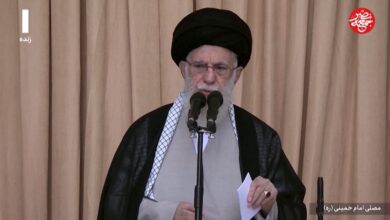
A former spokesman for the Israel Defense Forces has sharply criticized Israeli Prime Minister Benjamin Netanyahu’s conduct of the war against Hamas, in the latest sign of growing tensions between the military and the government.
Lt Col. Peter Lerner said that while speaking with the world’s media on behalf of the military, he came to realize the “loss of international trust in Israel and the government’s failure to maintain widespread support for the war against Hamas over time.” Lerner served in the IDF for more than 25 years – most recently as a spokesman during the war, before stepping down last month.
Lerner was speaking in an extended interview with the Israeli newspaper Haaretz.
“Netanyahu promised a complete victory over Hamas,” he said. “But in the international arena he and his government led us to defeat.”
Lerner told Haaretz that in the early days of the conflict, following Hamas’ attack on Israel on October 7, “There was a clear understanding that Hamas is an evil and dangerous organization, and that Israel must act against it.”
That goodwill quickly eroded, he said, partly because of the inevitable suffering of Palestinian civilians as the IDF began the ground invasion of Gaza. But he also blamed the government, saying “there is no political strategy for the war, even after nine months in which we are fighting on two fronts.”
Lerner said that as he was increasingly asked about the goals of the operation, “I quickly realized that I had no answers to these questions, not because they haven’t been decided yet, but because they simply aren’t going to be decided.”

He said he felt like “a soldier who goes to guard without cartridges… I don’t have the ammunition I need to deal with the interviewers’ questions. I just had to say that I am speaking on behalf of the army, and that these questions are the responsibility of the government. But the government also had no answers, because it was politically inconvenient.”
Lerner was also critical of ministers who – he maintained – had reduced the legitimacy of Israel’s actions in Gaza.
“Hamas damaged almost all the power lines that connect Gaza to Israel,” he said. “We had the opportunity to come and say: Hamas is harming the citizens of Gaza, and we, Israel, will try to fix it, but only if he stops the shooting. Instead, the Minister of Energy at the time, Israel Katz, comes out with populist statements about the fact that he will cut them off from electricity and will not deliver fuel to them either.”
Lerner quoted a remark by Netanyahu in 2016 that the test in the field of propaganda is very simple: Were your hands tied when you wanted to defend yourself?
He said the Prime Minister had failed that test “miserably. The US and the UK are cancelling arm s shipments, France forbids us to participate in a large arms exhibition. We delayed for months the entrance to Rafah. This issue requires a state inquiry commission, just like the failures of October 7.”
Lerner’s remarks follow multiple accounts of tensions between Netanyahu and Israel’s military leadership.
Last week, Netanyahu rejected the idea of starting a ceasefire in Gaza while Hamas remains in power, after the New York Times published an article citing six current and former security officials who said a truce would give Israeli troops time to prepare for a potential land war with Hezbollah.
The officials, most of whom spoke anonymously to “discuss sensitive security matters,” also said a truce would be the most effective way to secure the release of the Israeli hostages.
Former Israeli National Security Advisor Eyal Hulata, who according to the Times maintains regular communication with “senior miliary officials,” spoke on the record, saying, “the military is in full support of a hostage deal and a cease-fire… they believe that they can always go back and engage Hamas militarily in the future.”
In a statement, Netanyahu said, “I do not know who these anonymous sources are, but I am here to make it unequivocally clear: This will not happen. The war will end once Israel achieves all of its objectives, including the destruction of Hamas and the release of all of our hostages.”
That report came days after Israel’s top military spokesman, Rear Adm. Daniel Hagari, said Hamas could not be destroyed, and that anyone who claimed otherwise was “throwing sand in the eyes of the public” – an implicit criticism of Netanyahu, who has repeatedly pledged to eliminate the group.




